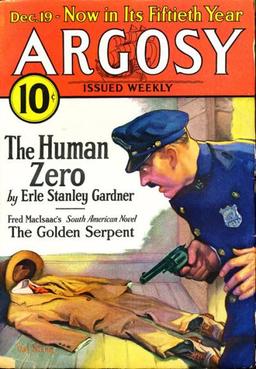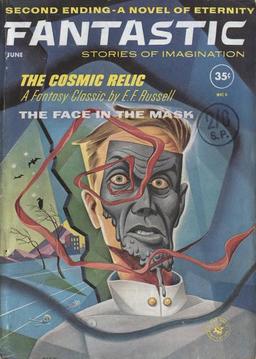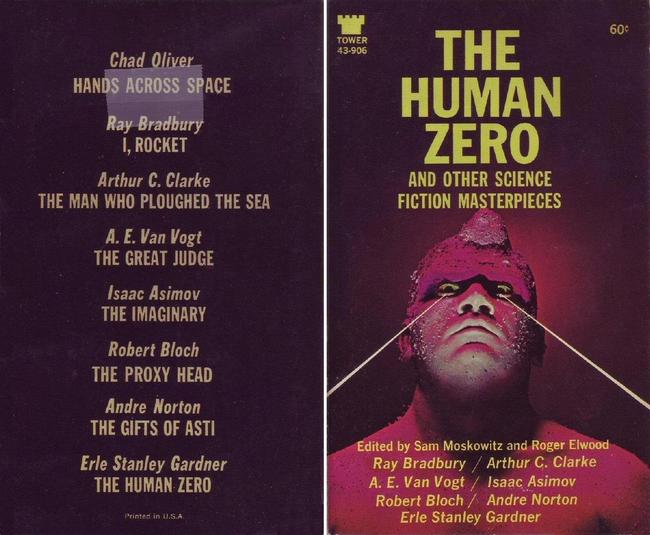Invading Aliens and Self-Aware Submarines: The Human Zero, Edited by Sam Moskowitz & Roger Elwood
The Human Zero and Other Science Fiction Masterpieces
Edited by Sam Moskowitz & Roger Elwood
Tower Books (224 pages, $0.60, 1967)
Cover artist unknown
Most of the names in The Human Zero are well-known SF writers, with a few notable exceptions. Perhaps Chad Oliver is well-known to more avid SF fans than I, but I didn’t recognize the name. Then there’s the odd man out here — Erle Stanley Gardner. Who wrote a great deal of fiction in his day but is best known for introducing the character Perry Mason to the world.
Not much to see in this collection of eight stories, at least by my reckoning. Two of the stories managed an Okay rating and the rest of them didn’t cut it.
Okay
 “The Human Zero,” by Erle Stanley Gardner
“The Human Zero,” by Erle Stanley Gardner
Gardner wrote a truly amazing amount of magazine fiction in the year 1931 (and the years surrounding it), which is the year this work first appeared in Argosy magazine. This story has the feel of hastily written pulp work and its primarily a crime fiction story with a sort of SF-like wrinkle that apparently justified including it in this anthology. It’s a fairly straightforward tale that finds the cops and a PI sorting out a kidnapping, one that’s complicated by that SF-like wrinkle.
“Hands Across Space,” by Chad Oliver
Cold War parable, anyone? Aliens and Earthlings each send a carefully chosen representative to the first meeting between the races. Suspicion is rampant and there are a few so-so twists along the way to a happy ending.
Thumbs Down
“The Man Who Ploughed the Sea,” by Arthur C. Clarke
The title kind of sums it up — mining minerals from ocean water. I like Clarke but this one felt like a fictionalized version of a scientific paper.
“The Proxy Head,” by Robert Bloch
Invading aliens send out an advance scout. It’s a cyborg/android/robot/whatever that wanders about, noting, recording and musing upon the quaint customs of the natives. The catch, which sets up the ending, is that Mr. Android can’t get wet. Gimmicky.
“Itself,” by A. E. van Vogt
 A self-aware submarine protects against aliens. Very short and didn’t do anything for me. This one first appeared in a series of advertisements for an electronics company that also commissioned stories from the likes of Heinlein, Asimov and others.
A self-aware submarine protects against aliens. Very short and didn’t do anything for me. This one first appeared in a series of advertisements for an electronics company that also commissioned stories from the likes of Heinlein, Asimov and others.
“The Imaginary,” by Isaac Asimov
An exploration of mathematics and psychology as it relates to a rare type of squid. Or something like that. I’m all on board with hard SF, to a point, but this one lost me pretty early on.
“The Cosmic Relic,” by Eric Frank Russell
After six fairly unexceptional stories, I thought that Russell’s yarn might be an improvement. It’s a first contact story about a mysterious ship that lands on Earth and the efforts of a few scientists to figure it all out. It starts out well but the figuring out phase drags on and then, as things start to actually happen, the story seems to lose its way.
“I, Rocket by” Ray Bradbury
There are probably not many writers other than Ray Bradbury who could pull off a story of an interplanetary ship told from the standpoint of the ship. Unfortunately, for my money, he didn’t actually pull it off. I like Bradbury as well as the next person and one expects a certain amount of sentimentality in his writing but this time around he laid it on a bit thick.
William I. Lengeman III’s last article for us was Defending Children of Dune. He holds forth at www.wileng3.com.

Chad Oliver is one of my heroes and one of the first SF writers I ever read, back when I found The Winds of Time and Mists of Dawn in the great Winston SF series. (Great being a relative term here. It seemed great to me when I was a kid.) He’s also a Texan and was well known for many years after the ’50s to Texas SF readers. Wrote some really good stuff, too. Taught anthropology at The University of Texas at Austin for a long time.
Curiously enough, my next Retro Review here at Black Gate will be of the January 1962 Fantastic, for which Sam Moskowitz (he of the (in my opinion) dreadful taste) chose “The Human Zero” as a classic reprint.
Love that Cubist cover art on Fantastic.
Is it just me, or is the cover art on Human Zero downright disturbing?
Joe — it’s not just you. It’s a terrible cover. I don’t mind that Art Directors for paperback books in the 60s were constantly experimenting with photography, but in this case the experiment was a failure. I mean, what the hell is that thing on his head?